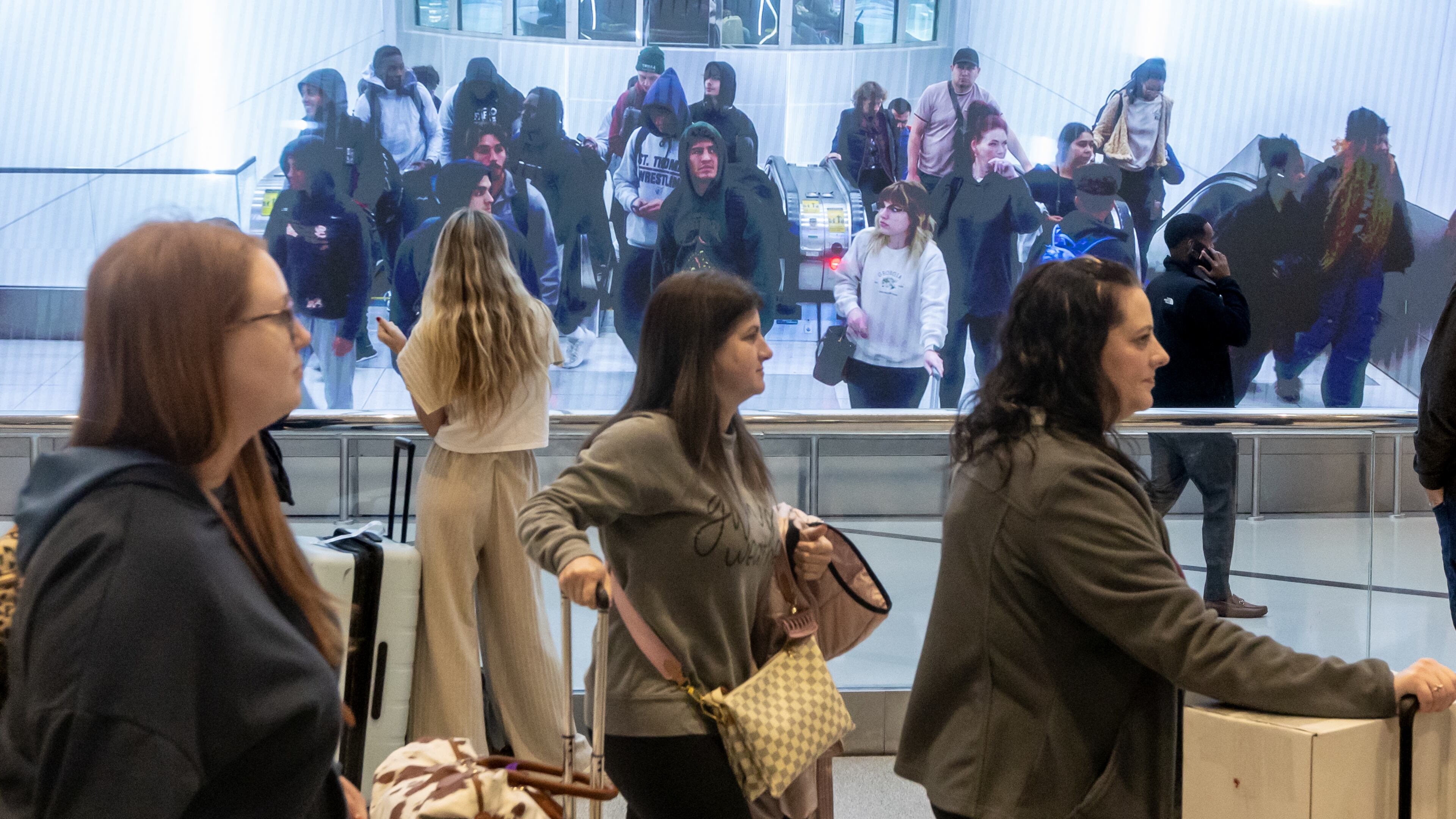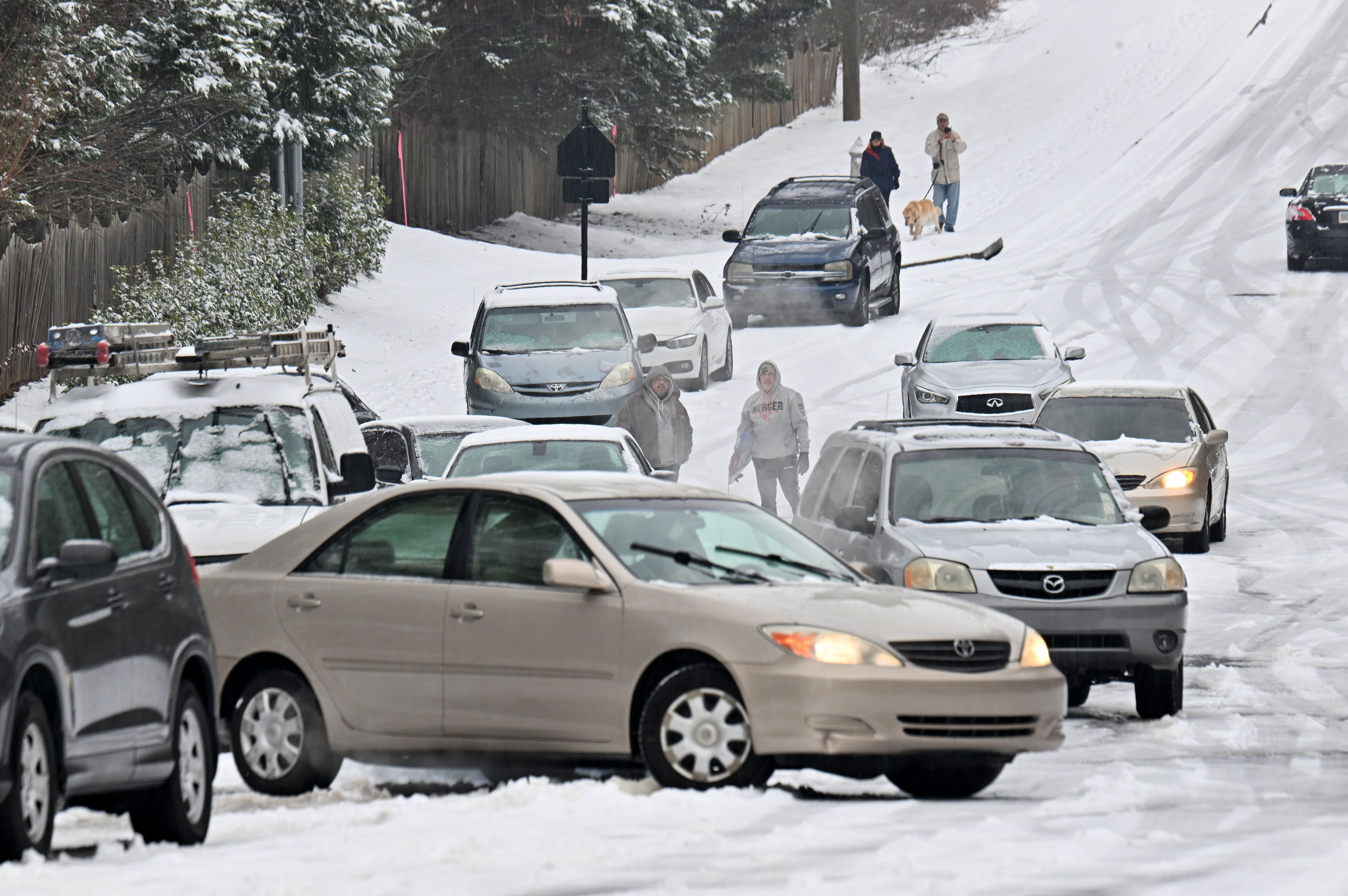Failed health inspections sent the Atlanta airport scrambling to fix problems

In January of last year, the director of the Atlanta airport‘s concessions program, Scott Knight, wrote a warning email to the businesses that operate the airport‘s 165 food and beverage establishments.
The airport‘s internal inspectors had just temporarily closed three locations for food safety violations on the same day, he said, representing a “new poor performance record for our community,” Knight wrote.
“This is your Alarm Bell” to “recover the required performance standards,” he said.
Evidence of “poor daily decisions is all around,” he wrote in the January 2024 email obtained by The Atlanta Journal-Constitution.
“Many locations are being operated without supervision” and “health standards are slipping,” he said.
But in the year that followed, the Clayton County district of the Department of Public Health still issued seven food safety inspection failures on airport property, up from six failures in 2023. Per the state, a failing DPH score is 69 or below.
That compares to just one failure in 2022 and two in 2019, the peak pre-pandemic travel year.
Hartsfield-Jackson Atlanta International Airport‘s concessionaires have no easy job.
They served a daily average of nearly 300,000 passengers last year, operating in tight spaces and under strict security with many factors beyond their control — whether it be airport electrical and climate control systems or having to stay open late to accommodate flight delays.
“There is no operator that would say that operating in the airport is not significantly harder than operating street side,” said Randy Hazelton, a founding partner of H&H Hospitality, which runs five restaurants at the airport.
Knives have to be tethered to the walls. Freezer and fridge space is limited, Hazelton said.
Food safety, however, shouldn’t be impacted by any of those complexities, he said, and he said his locations have never seen a DPH failure.
Unlike streetside restaurants, the airport has an in-house “Quality Assurance Audit” program to root out potential food safety and customer service issues before something like a health department failure.
But the bump in failures in 2023 and 2024 raises questions about food safety oversight at the world’s busiest airport.
A review of the internal inspections of the same locations that saw DPH failures showed that even when airport inspectors flagged several patterns of problems in 2023 and 2024, county inspection failures still followed.
In a statement, Knight defended the airport‘s program to the AJC. It is “designed to serve as an early warning system, helping businesses address potential issues before external reviews.”
He said in the year since his “Alarm Bell” email they’ve seen “improved response times, stronger corrective actions, and an increased commitment from operators to maintain compliance.”
No businesses at the airport have failed DPH inspections so far this year.
The airport‘s program does not oversee lounges like the American Express Centurion Lounge that failed a DPH inspection in December or the Delta Sky Clubs that failed in 2022 and 2023; all have passed their most recent inspections.
Paradies
While the spate of ATL inspection failures happened across multiple concessionaires — large and small — one company saw more 2023-2024 failures than any other, across five locations: Atlanta-based Paradies Lagardère.
Paradies operates a broad range of airport restaurants and shops across North America and in Atlanta, including brands like Chick-fil-A, Wendy’s and Tropical Smoothie Cafe.
In a recent interview, multiple company executives asserted that it “immediately” addressed all violations, often within hours.
Over the past year, Paradies said it has instituted new real-time food temperature monitoring technology across all airport locations. The company has ramped up employee training and late last year hired its own in-house Atlanta food safety inspector.
While Paradies has not seen any DPH failures this year, it saw five more failed internal airport inspections in February and March.
In a follow up statement Tuesday, the company said it corrected food safety violations within 24 hours and pointed to its new range of “ongoing preventive measures.”
“There‘s constantly new tools and resources and efficiencies and innovations that make themselves available,” said Michael Pietryka, Paradies’ head of marketing and communications. “We‘re constantly looking at those, figuring out what would work in our organization.”
But before these improvements were implemented, the story of one troubled Paradies location last year illustrates that even with repeated red flags from the airport‘s inspectors, a pattern persisted for months.
When an airport inspector visited the Freshens on Concourse E in April 2024, they found cleanliness violations on the floors, walls and ceilings, pests including fruit flies and improper employee hair restraints. That added up to a failing score of 65.
Just one month later, a DPH inspector closed the location with a 67 score for food stored at improper temperatures, past due-date lettuce, a dirty microwave and fruit flies.
While Freshens passed a follow up DPH inspection with an 80 two weeks later, fruit flies remained in the area.
An airport inspector returned in August and gave a score of 69. Flies were still present and employees had not been doing food temperature checks for a few weeks. In October, it scored an 84, and flies were gone.
But again in November, Freshens failed another DPH inspection, citing food temperatures, uncovered food items and flies again.
Eight months after the first internal red flags, Freshens in December got a 93 from DPH.
One of the airport‘s primary enforcement mechanisms for concessionaires is a system of fines; Freshens did not receive any fines for these failed inspections.
Knight told the AJC fines are not “automatically” issued for failed audits.
“They are assessed based on repeat non-compliance, severity of violations, and failure to take corrective actions within a required timeframe,” he said.
Freshens does not operate the location, but the Atlanta-based brand’s senior vice president, Joe Sardina, said it has increased on-site visits “to ensure that all brand standards, practices and operational procedures are followed correctly.”

COVID-19
The story Paradies tells of how these failures happened reflects the larger one Knight says was behind the airport-wide spike.
The situation, Knight said, should be “considered in the proper context,” as businesses worked to recover after the pandemic, when many were forced to close and then scrambled to handle a bounce-back in travel demand.
Paradies executives said that was especially challenging for hiring and retaining new staff.
“We were losing people. We weren’t getting them trained fast enough,” said Osayande Brooks, Paradies’ director of food safety and quality assurance.
Language barriers were a challenge, as was poaching by competitors in the tight labor market. The company had many “brand new” and “nervous” employees as a result, he said.
To attract and retain workers, Paradies hiked pay, said Wassim Takriti, its regional vice president of dining operations.
Freshens was the only Paradies outlet with multiple DPH failures, though its Gordon Biersch, Panda Express and Wendy’s locations also received failing grades in 2023-2024.
But another major Atlanta airport concessionaire, Delaware North, saw similar persistent violations at its restaurant Grindhouse Killer Burgers in Concourse T.
Just as with Freshens, violations were flagged repeatedly by airport inspectors — but the location still failed two DPH inspections in December 2023 and August 2024. The location passed its most recent DPH — and airport — inspections with scores in the high 90s.
As with Freshens, however, the airport‘s inspections turned up a raft of issues at Grindhouse, including unsafe food prep practices, a persistent fly problem, food temperature violations and food debris on knives, in the kitchen and the cooler.
In 2024, airport inspectors were returning nearly monthly and gave four failing grades below 70 on top of the DPH failure in August 2024. The airport fined the location once for its QAA score in June 2024.
Atlanta-based Grindhouse, which licenses its brand to the concessionaire, referred the AJC to Delaware North.
The company said its management team “worked closely with inspectors to address their findings. Any identified violations were promptly corrected, and operations were confirmed to be fully compliant upon the inspectors’ return visits.”

From ‘the moment you open the doors’
The airport environment presents unique challenges outside of operators’ control.
Typical restaurants rely on downtime between meals to do pre-shift work, but at the airport “you’re busy from the moment you open your doors all the way down to the last flight,” Takriti of Paradies said.
The tight, often overheated spaces can also affect equipment function, he said. Especially in the summer, “the equipment gets a beating.”
And despite their past food safety violations, Paradies defended its most recent contract awarded last fall to run seven more food and beverage locations.
Knight told the AJC that “food safety performance remains a critical factor” in evaluating concessionaires.
“Some things pop up that may be out of our control, but we‘re going to make the adjustments to make it right. That‘s the mark of a good operator,” Pietryka said.


